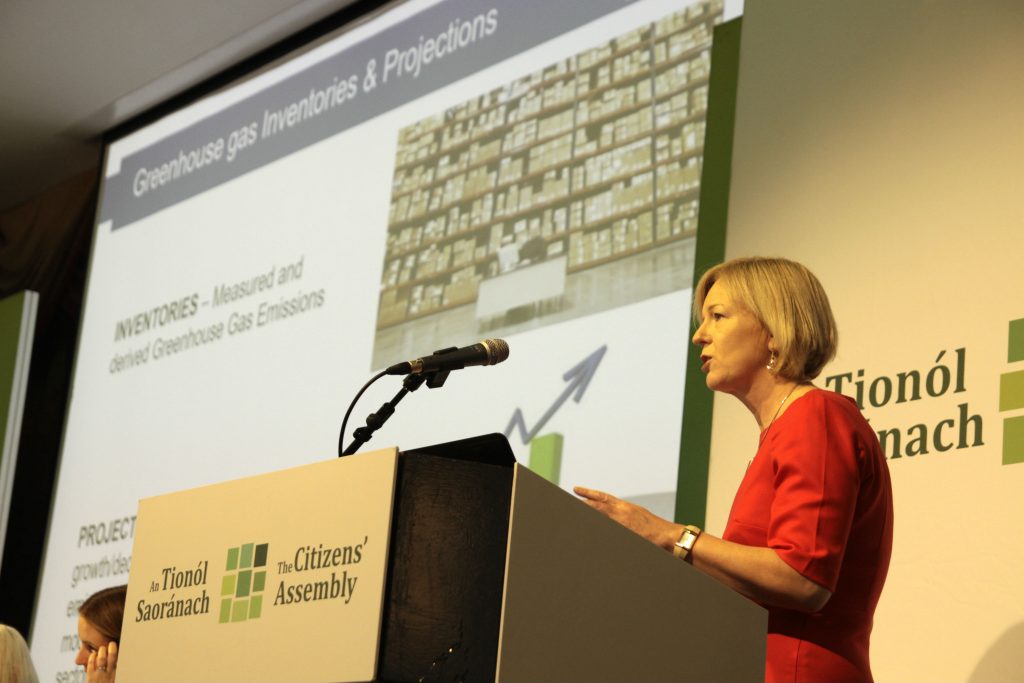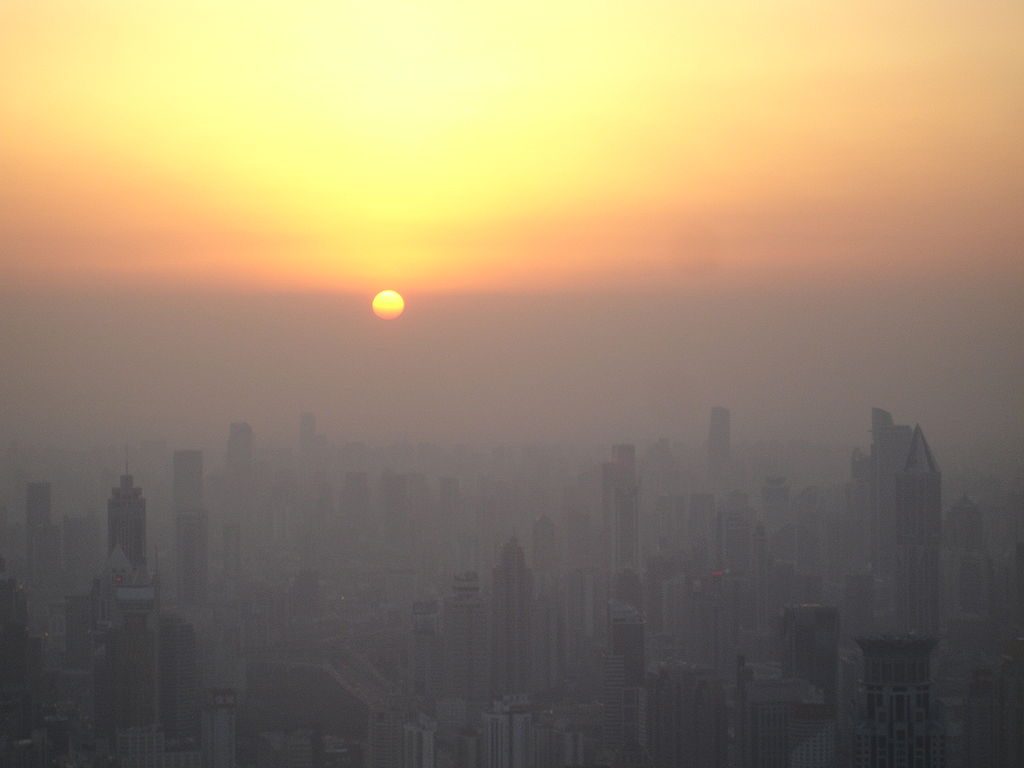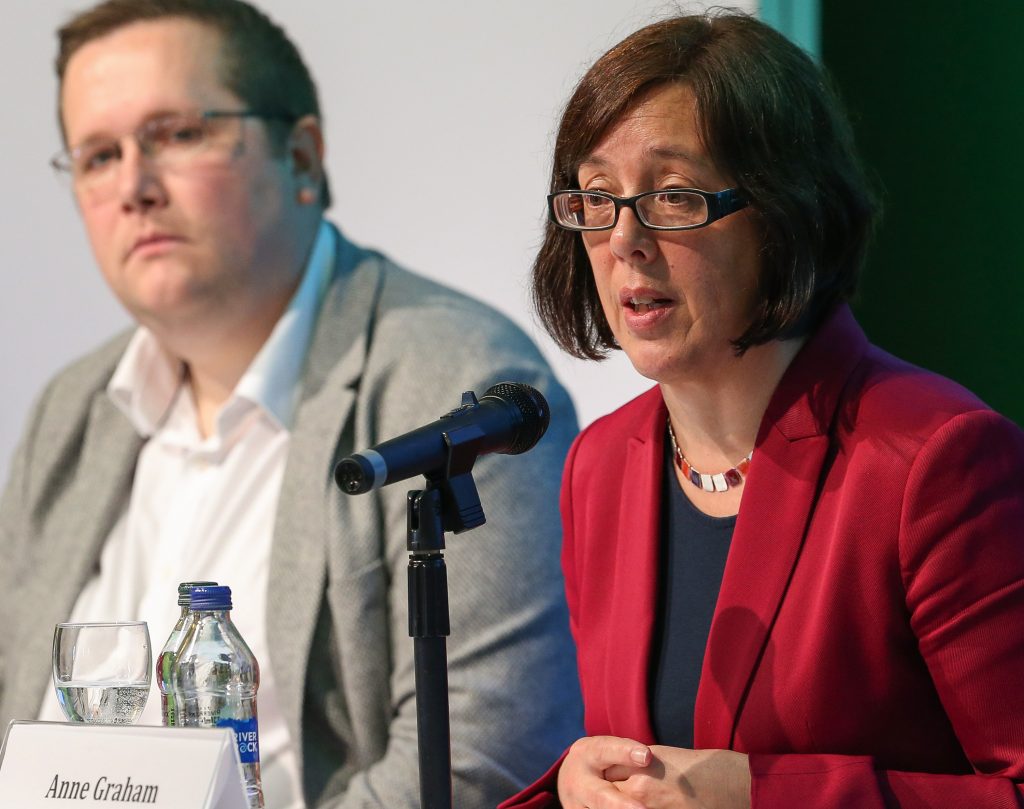EPA Report: Burning coal and peat biggest threat to air quality in Ireland

November 6th, 2017
The continued burning of solid fuels such as peat and coal is the key driver of poor air quality in Ireland, according to a new report from the Environmental Protection Agency.
The levels of dangerous particulate matter in our air are of “growing concern” to the EPA, with solid fuel use set to increase during the winter months, particularly in small towns and villages.
The environmental watchdog’s report on air quality in Ireland in 2016 also singles out traffic as a key pressure on air quality in our largest cities.
Overall, Ireland’s air quality is good by European standards, but it does not fare so well when measured against more stringent World Health Organisation (WHO) guidelines, the report states.

EPA Director Laura Burke at Citizens’ Assembly Photo: Niall Sargent
Excess particulate matter levels
Ireland exceeded WHO guideline values for PM10 and PM2.5 – very fine particulates smaller than 10 micrometers that can enter the lungs and cause major health problems.
EPA Director Laura Burke said it is clear that there is “no safe level of pollutants” as air quality is estimated to cause the premature death of over 1,500 Irish people every year.
“With this in mind, it is time to tackle the biggest issue impacting on air quality in Ireland – emissions from solid fuels in our small towns around the country,” she stressed.
Ireland is required to reduce exposure to PM2.5 levels by 10 per cent between 2012 and 2020 under EU legislation.
Ms Burke, however, called on the EU to bring its standards in line with “tighter” WHO guidelines to ensure higher legal and enforceable standards across Europe and in Ireland.
Other Pollutant Problems
Nitrogen dioxide – mainly from vehicle exhaust emissions – and sulphur dioxide levels were also above WHO guideline values at a number of monitoring stations, the report added.
Concentrations of polycyclic aromatic hydrocarbons (PAHs) were also found to be above reference levels from the European Environment Agency.
PAHs are a group of over 100 chemicals formed during the incomplete burning of coal, oil, gas, wood, garbage, or other organic substances, such as tobacco.
According to US’ Agency for Toxic Substances and Disease Registry, individuals exposed by breathing or skin contact to mixtures containing PAHs for long periods can develop cancer.

Shanghai at sunset Photo: Suicup
Air Quality Monitoring Programme
Data in the report comes from 30 monitoring stations in operation during the year. The EPA plan to expand this network through a new monitoring programme launched this morning.
A total of 38 new stations will be installed across the country by 2020 to increase the availability of localised real-time data and enhance the EPA’s modeling and forecasting capabilities.
According to Patrick Kenny, EPA Air Quality Manager, the new programme will also ensure that there is better engagement with the public on the topic of air quality”.
“[The Programme] will significantly improve the availability of localised real-time air quality information to enable the public to make informed decisions and better inform national and regional policymakers,” Mr Kenny added.

Anne Graham (R), CEO National Transport Authority, with Dr. Brian Caulfield (L), TCD, Photo: MAXWELL’S
Get out of your car
The Citizens’ Assembly heard this weekend that a complete transformation of the Irish transport sector is vital to ensure a smooth transition to a low-carbon, climate resilient society.
The transport sector accounts for 21 per cent of greenhouse gas emissions in Ireland, with cars accounting for over half of total transport emissions.
The number of cars on Irish roads is predicted to increase from 2 million in 2016 to over 3 million in 2050 in line with the economic recovery.
Trinity College Dublin Professor Brian Caulfield told the Assembly that Ireland needs to move away from private car use to sustainable public transport networks, walking and cycling.
While the level of investment required is a major “barrier” to overhauling our transport structure, Prof Caulfield said that it will have wide economic and health benefits.
CEO of the National Transport Authority, Anne Graham, also told the Assembly that an environmentally sustainable transport sector must be at the “forefront of our thinking as part of the solution to tackle our reliance on fossil fuels”.
[x_author title=”About the Author”]







